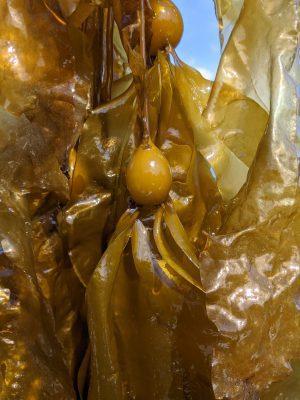
A tribal nonprofit with a mandate to protect the subsistence lifestyle through implementation of natural resource management is assessing Prince William Sound’s potential for kelp farming.
“We have seven test farm sites permitted and will be permitting two more soon,” said Willow Hetrick, executive director of the Chugach Regional Resources Commission. The sites are located near Cordova, Chenega and Tatitlek.
“The goal of the test farm sites is to understand the ecosystem, so we can have a good location for the Alaska Native community to enter into the kelp market,” she said. “The kelp nexus was natural to us as a food source for direct consumption and to provide economic opportunity for our communities. The Native Conservancy in Cordova is a partner in this grant, she said.
The Native Conservancy also noted in a news release on Tuesday, July 13, its continuing efforts to reintroduce kelp farming in Cordova and its efforts in carbon sequestration research as new kelp seed lines are deployed at the test sites this fall and winter. Results of this research will help reduce risks to help farmers, regenerate the economy and better equip the Conservancy to support future Native kelp farmers on how to secure permits, design and deploy arrays, secure seed lines and properly care for their growing kelp, the conservancy said.
Ultimately there will be nine farm test sites in Prince William Sound where sori, baby kelp, being raised now at the Alutiiq Pride Shellfish Hatchery in Seward, will be out-planted, with a goal of a harvest in April or May of 2022, said Hetrick, who holds graduate-level degrees in natural resources and environmental management and public administration with a focus on natural resources policy. Hetrick’s career experiences have included a variety of marine and terrestrial biology research, collaborating on projects with state, federal, public, and non-government organizations, as well as private stakeholders, federal and state permitting, regulatory compliance and cultural community sensitivities.
The kelp seed hatchery is based at the Alutiiq Pride Shellfish Hatchery in Seward, which has been in operation since 1992, with the initial goal of raising oyster and geoducks for the aquatic farming industry. Willow’s father, Jeff Hetrick, director of APSH, has over 30 years of experience in the Alaskan aquaculture industry.
While the grant itself does not support market interests, CRRC is thinking about that in the long term, as kelp is already being used by several small companies making kelp salsa, kelp burgers and kelp nutritional supplements, and as an ingredient for smoothies and seasonings for other foods, Willow Hetrick said.

The project is funded through a $520,518 Coronavirus Aid, Relief and Economic Security Act recovery assistance grant awarded to CRRC in April by the federal Economic Development Administration, an agency within the U.S. Department of Commerce. The EDA received a total of $1.5 billion for economic assistance programs to help communities prevent, prepare for and respond to the impact of the novel coronavirus, which has had a devastating effect on the health and economies of communities worldwide.
The EDA investment is intended to develop a fully integrated kelp industry in Prince William Sound by creating kelp seed hatchery capacity, conducting baseline kelp growing research at the farm test sites training project partners and providing processors products for market development, EDA officials said.
The grant is matched with $97,235 in local investment and is expected to create 85 jobs and retain 128 jobs, EDA officials said.
“This project will stimulate local kelp farming and processing jobs in the seafood industry, bolstering the region’s ability to withstand future economic disruptions,” said Dennis Alvord, acting assistant secretary of commerce. The project won kudos from Alaska Senators Lisa Murkowski and Dan Sullivan and Rep, Don Young, all R-Alaska, for its job potential and economic boost to the Prince William Sound region.
Murkowski praised the rapidly growing kelp farming industry as an exciting and critical element of Alaska’s blue economy, thanking the Biden administration for recognizing the importance of Alaska’s seafood industry through this grant to develop aquaculture in Prince William Sound.
“Alaska’s rocky coastal waters are brimming with potential when it comes to kelp, which could help address a myriad of global challenges, including climate change, ocean acidification, plastic marine debris, food insecurity and many others,” Sullivan said.
Through this grant, the EDA will help create and retain Alaskans jobs and bolster Alaska’s economy to withstand future disruptions, Young said.





